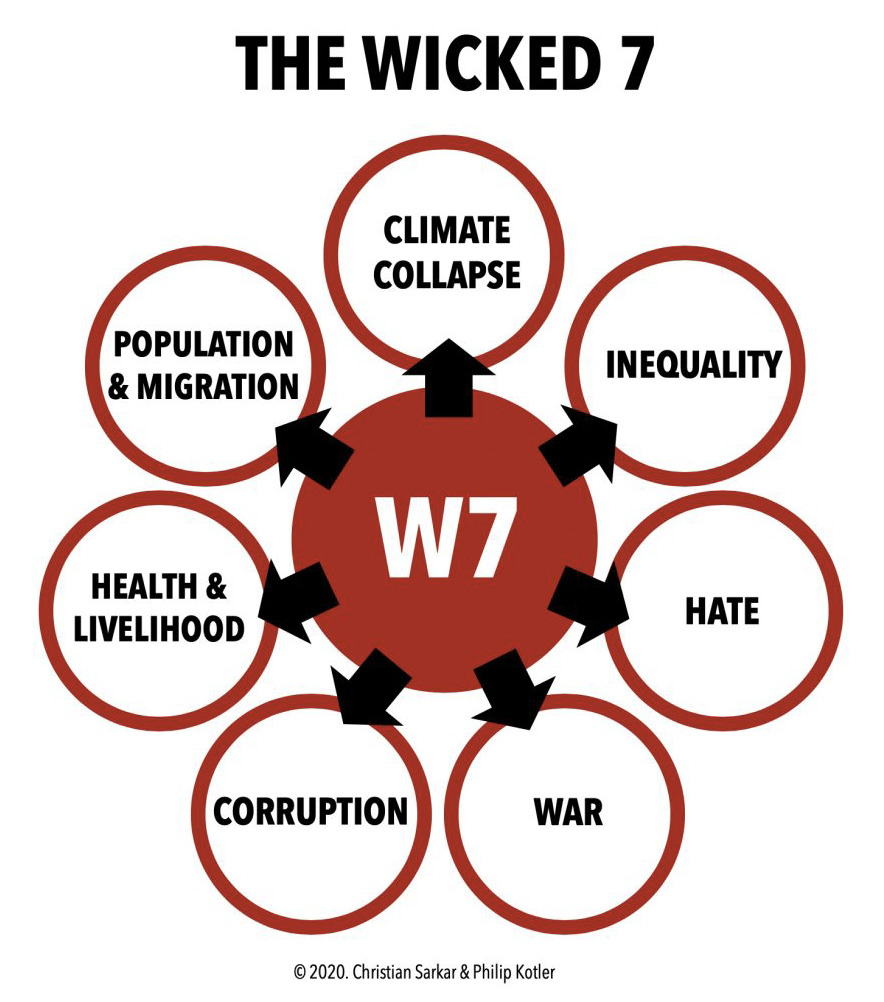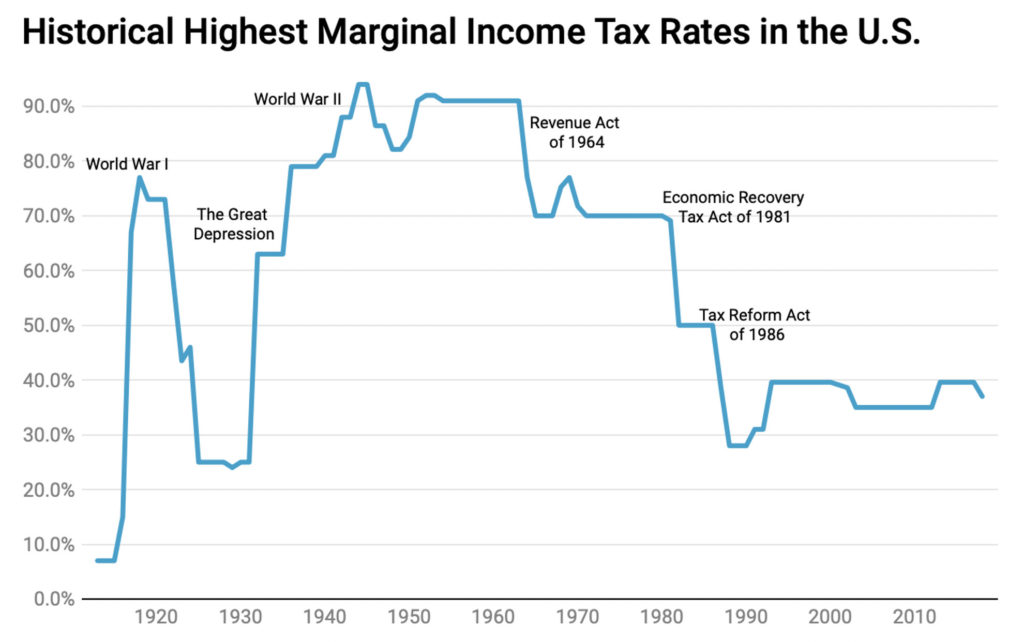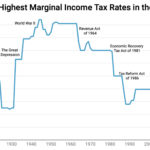By Philip Kotler and Christian Sarkar
The cover of the May 20, 2020 issue of Forbes magazine carries a picture of Larry Ellison, billionaire founder of Oracle Corporation. On page 114, there’s a Billionaires Index that runs six more pages in very small print. The following becomes clear:
- Almost every country has billionaires. Even Venezuela and Zimbabwe each has one billionaire.
- The U.S. has the largest number of billionaires, around 624.
- China has the second largest number of billionaires, 390. Not bad for a country professing communism. In fact, the number of Chinese billionaires is even higher, because Hong Kong is listed separately with 66 billionaires, and independent Taiwan adds additional 40 Chinese billionaires.
- Germany has 110 billionaires, Russia has 102 billionaires, followed by India with 94 billionaires.
- Each of the remaining countries has fewer than 100 billionaires, with many in Australia, Canada, France, Switzerland.
- I would guess that there are more billionaires who were not known by Forbes or not counted because their wealth couldn’t be estimated. This would include royals, dictators, and criminals. I would venture that the world has somewhere between 2,000 to 2,200 billionaires. The estimated total net wealth of the world’s billionaires is over $8 trillion.
Our thesis is that billionaires could become a force for good – especially if their resources were used for the Common Good. There are three way this can happen:
- The billionaires suddenly realize that the Common Good of the planet is an important goal for them, so they join forces to save humanity and Nature,
- Our governments make billionaires pay their “fair share” of taxes, or
- Society decides that billionaires shouldn’t exist, and our governments simply tax them out of existence.
Will the billionaires agree to higher taxes? In the recent US elections, we recall that Bernie Sanders suggested billionaires should be taxed out of existence, while Joe Biden warned us against demonizing the wealthy.
There’s a common myth that there will always be billionaires. And the media worships billionaires like Bill Gates and Warren Buffett who illustrate that some billionaires can work for causes that are beyond their own selfish interests.
Where do Billionaires Come From?
We should start by asking where do billionaires come from? Do they just spring out of the fertile digital soil of Silicon Valley? Can anyone – with enough hard work – become a billionaire?
Get Evonomics in your inbox
So how do you become a billionaire? Robert Reich, former U.S. Secretary of Labor, explains four sources of wealth:
- Inherited Wealth: around 60 percent of wealth in the US is inherited. The best chance you have of becoming a billionaire is to marry or be born into intergenerational riches.
- Monopolies: Jeff Bezos’ Amazon accounts for nearly 50 percent of all e-commerce retail sales in America. Our patent and trademark systems, which have been extended in duration, create billionaire like George Lucas and Oprah Winfrey.
- Insider Information: Hedge fund billionaire Steven A. Cohen made “hundreds of millions of dollars of illegal profits” – through his expertise in insider trading. This is not an isolated incident.
- Politics: You can invest in politicians – or even bet on them, like racehorses – through your timely campaign contributions. Americans for Tax Fairness estimates that Charles Koch and David Koch and/or Koch Industries could save between $1 billion and $1.4 billion combined in income taxes each year from the Trump tax law―and that doesn’t include how much the Koch Industries save in taxes on offshore profits or how much their heirs will benefit from weakening the estate tax.
Good luck with these four strategies.
Without them, the average US worker would have to work for 25 thousand years to become a billionaire.
How has the number of billionaires grown over the past few decades? In 1996 there were 423 billionaires spotted in the wild. In 2019, that number rose to 2,153. Billionaires constitute just 0.00003 percent of the world population, but they currently own the equivalent of 12 percent of the GWP (gross world product) and a much larger percentage of the total wealth of the world.
Interestingly, even as COVID destroyed the economy, billionaires got richer – to the tune of $10.2 trillion.
The Billionaire’s Defense
Arguments used to defend billionaires are often based on the story that without billionaires, society would not progress – innovation and philanthropy would diminish – making life even worse. Facebook CEO Mark Zuckerberg, worth $70bn, explains this in an appearance on Fox News. Billionaires should not exist in a “cosmic sense,” but in reality most of them are simply “people who do really good things and kind of help a lot of other people. And you get well compensated for that.” He warned about the dangers of ceding too much control over their wealth to the government, allegedly bound to stifle innovation and competition and “deprive the market” of his fellow billionaires’ funding for philanthropy and scientific research.
“Some people think that, okay, well the issue or the way to deal with this sort of accumulation of wealth is, ‘Let’s just have the government take it all,” Zuckerberg said. “And now the government can basically decide, you know, all of the medical research that gets done.”
So who decides what research gets done? The drug companies? The billionaires themselves? There is a serious argument to be made that allowing billionaires to decide societal priorities is profoundly undemocratic. Should mega-rich donors like Bill Gates drive philanthropy, usurping the role of democratic governments to decide what social ills to tackle and how?
Even in terms of innovation, Zuckerberg is wrong. The Information Technology and Innovation Foundation (ITIF) reports that while in the 1970s almost all innovation winners came from corporations acting on their own, more recently over two-thirds of the winners have come from partnerships involving business and government, including federal labs and federally-funded university research. Moreover, in 2006, 77 of the 88 U.S. entities that produced award-winning innovations were beneficiaries of federal funding.
Facebook, for all Zuckerberg’s talk about innovation, makes the bulk of its profits from selling access to customer data via advertising. It’s certainly not a fountain of societal innovation.
Unfortunately, the record of billionaire activism is not always a stellar example upholding human values or even democracy, for that matter. The John Birch society, for example, was principally backed by Fred Koch, the father of the infamous Koch brothers. The society famously attacked Martin Luther King and the Civil Rights movement, as well as JFK – with a campaign to spread hate just two weeks before his assassination in Dallas. This thread of regressive billionaire activism continues to this day. The John Birch society’s tired slogan – “this is a republic, not a democracy” is now being amplified by the Trumpists.
These are billionaires who are not interested in the Common Good. In fact, it is their actions that have driven our society to a level of public insecurity and mistrust, not seen since the 60s, or the Civil War, as some have argued. Clearly, not all billionaires are interested in saving the world.
Will Billionaires Solve the World’s Biggest Problems?
Our world is plagued with wicked problems. Recently, we started a project studying what we can do to mitigate the 7 most Wicked Problems in the world. COVID-19, for example,would be classified under “health and livelihood” and hopefully the new vaccines will get the coronavirus problem under control within a few years.

Note that one of the Wicked7 problems is inequality. As a problem, it also contributes to other problems such as war and health and livelihood. Inequality is an insidious and growing problem and it is intrinsically related to the growing number of billionaires in the world. As the number of billionaires increase, and average incomes remain the same, income inequality grows as a problem.
Given that these wicked problems are an existential threat to our future as a civilization, why is it that the smartest minds in the world are still busy working on algorithms to maximize advertising efficiency or building financial instruments for hedge-fund profits?
What would happen if the world drafted Bill Gates, Elon Musk, Tim Cook, Jamie Dimon, and Jeff Bezos – gave them a mission to find solutions to “save the planet in the interest of the common good” and then presented their “solutions” to the governments of the world – put them to a global vote? The Big 5 CEOs could afford to be paid nothing for this challenge. Well, isn’t that what they should be working on? Paul Polman, former CEO of Unilever, could also be drafted as the project manager of this Manhattan Project to save humanity. Let’s lock them in a “zoom-room” for the next six months and see what they come up with – we’re pretty sure their businesses will continue doing well without batting an eyelid.
Narrowing the Distance between the Rich and the Poor?
We also must ask: what would happen if our governments started working for the Common Good?
What would it mean to the world if we (1) got rid of monopolies, (2) stopped the use of insider information, (3) prevented billionaires from buying off politicians, and (4) made it harder for the billionaires and their corporations to avoid paying taxes?
You can’t – as the late Paul Polak used to say – “donate your way out of poverty.” Billionaires know that just giving money to the poor is not a lasting solution. The statement is often made “don’t give fish to the hungry, just teach them how to fish.” The task is how to create a better education and better skills in people so that they can create value for others and get paid for the value they create.
A quick review of the history of taxation in the US shows us what’s been going on: for too long, too many wealthy persons have paid taxes on their wealth at a lower rate than their secretaries! Today’s top U.S. marginal income tax rate is 37%. This is the rate paid on the last bracket of income, not on the whole income. The rich person pays substantially less that 37% on his or her total income. The 37% bracket only affects persons earning an annual income of $518,400 or more.

Look at how high the top bracket income tax has been historically. The rate was almost 80% in World War 1, over 90% in World War II, and pushed down over time by Republicans to a low of 37%.
This 37% top tax rate seems ridiculously lower compared to Scandinavian countries that pay a top income tax rate of 70%. What do Scandinavians get back for this very high marginal tax rate. They get back “freedom from insecurity.” Scandinavians don’t have to pay for medicines, surgeries, college education, maternity leave, longer vacations, and so on. The evidence is clear that many Americans might prefer to live in a country with higher taxes on the rich, than in today’s America where at least 15-20% of U.S. citizens can’t meet their basic needs without help. Yes, most of us have plenty to eat but the important things we need like health care and a college education are priced as luxury goods.
Isn’t it interesting that US citizens have to pay US taxes no matter where in the world they earn their money, but our US corporations don’t have to do the same. And we thought corporations were people too!
Americans for Tax Fairness points out the loopholes:
- Tax avoidance through offshore tax loopholes is a significant reason why corporations, which paid one-third of federal revenues 60 years ago, now pay one-tenth of federal revenues.
- U.S. corporations dodge $90 billion a year in income taxes by shifting profits to subsidiaries — often no more than a post office box — in tax havens.
- U.S. corporations hold $2.1 trillion in profits offshore — much in tax havens — that have not been taxed in the U.S.
- General Electric, which uses a loophole for offshore financial profits, earned $27.5 billion in profits from 2008 to 2012 but claimed tax refunds of $3.1 billion.
- Apple made $74 billion from 2009-2012 on worldwide sales (excluding the Americas) and paid almost nothing in taxes to any country.
- 26 profitable Fortune 500 firms paid no federal income taxes from 2008-2012. 111 large, profitable corporations paid zero federal income taxes in at least one of those five years.
The simplest solution is to end tax “deferral.” Corporations would pay taxes on offshore income the year it is earned, rather than indefinitely avoid paying U.S. income taxes. This would also remove incentives to shift U.S. profits to tax havens, and it would raise $600 billion over 10 years.
Why isn’t this happening? Ask your local Senator or Congressperson. Chances are they are too busy raising campaign funds for their re-election.
Passing a higher tax on the rich only slows down the growth of their wealth. Senators Elizabeth Warren and Bernie Sanders have called for a wealth tax. Elizabeth Warren proposed that households should pay an annual 2% tax on their net worth above $50 million, and a 3% tax on every dollar of net worth above $1 billion. She recently added possibly raising the billionaire wealth tax rate to 6 percent instead of 3 percent to help pay for “Medicare for All.” Note that the working poor and the middle class do not pay higher taxes. The wealth tax is only paid by very rich.
Another solution is to raise the estate tax. Wealthy persons need a plan describing how their wealth should be divided upon their death. They cannot be allowed to avoid paying estate taxes on their wealth. Married couples won’t pay any inheritance tax on the first $22.36 million in exemptions. The tax on the remaining wealth after exemption is 40 percent.
The estate tax could yield more if two changes occurred:
- lower the tax-exempt amount to a much lower number, and
- increase the tax rate on the remaining amount from 40% to a much higher number – say 70%.
The government should increase the estate tax rate in a further effort to reduce the growing concentration of wealth in the U.S. Yet Republicans argue that higher estate taxes will lead to more avoidance and also lead talented people to work less hard or threaten to leave the country. I would counter-argue that there are a great many civic-minded talented people waiting to move up the wealth ladder and take their place. The tough issue is what the government will do with the higher estate taxes? Will it be used by government to increase wages and jobs? Or will it go into more defense spending and more bureaucracies? Why don’t we ask citizens to decide?
Convincing Billionaires to Consider the Future of the Planet
Let’s return to how to encourage the super-rich to give back more of their wealth to society. Bill and Melinda Gates and Warren Buffett carried out an excellent approach to this problem, with their giving pledge. They recruited billionaires to make a commitment to distribute half of their wealth to philanthropic causes within the next 10 years. Today 211 billionaires have made this pledge. Furthermore, each billionaire describes the cause(s) that might get his or her “give-back.” There is an argument to be made that if the rich have to “give back” to society, they took too much from society to begin with.
The recruiting effort is continuing. Imagine how many low income persons would benefit if 2,000 billionaires, not just 211 would implement a giving pledge.
Billionaires face the problem of identifying which giving causes would do the most good. This problem faces all the billionaires, including the largest ones: Jeff Bezos ($200B), Bill Gates ($98B), Bernard Arnault and family ($76B), Warren Buffett ($67.5B), Larry Ellison ($59B), Amancio Ortega ($55.1B), Mark Zuckerberg ($54.7B), Jim Wolcott ($54.6B), Alice Wolcott ($54.4B), and S. Robson Walton ($54B).
Billionaires prefer giving away their money to their favorite causes rather than giving their money as taxes to the U.S. Treasury. They want to control who gets the money. They might not want to see the money go to make or buy more weapons of war.
This problem has been dubbed “gilded giving” by the Institute for Policy Studies. Here is their description of the problem:
The charitable sector is currently experiencing a transition from broad-based support across a wide range of donors to top-heavy philanthropy increasingly dominated by a small number of very wealthy individuals and foundations. This has significant implications for the practice of fundraising, the role of the independent nonprofit sector, and the health of our larger democratic civil society.
- Risks to charitable independent sector organizations include increased volatility and unpredictability in funding, making it more difficult to budget and forecast income into the future; an increased need to shift toward major donor cultivation; and an increased bias toward funding heavily major-donor-directed boutique organizations and projects. The increasing power of a small number of donors also greatly increases the potential for mission distortion.
- Risks to the public include an increasingly unaccountable and undemocratic philanthropic sector; the rise of tax avoidance philanthropy; the warehousing of wealth in the face of urgent needs; self-dealing philanthropy; and the increasing use of philanthropy as an extension of power and privilege protection.
This privatization of charity and the job of government does not bode well for democracy or the common good. Yet there are exceptions. When Andrew Carnegie, the richest man at the time, decided to start giving back money to good causes, he landed on a brilliant idea. He wanted to raise the educational level of average Americans. Instead of giving money to colleges, he decided to build public libraries, first in America and later around the world. With public libraries, persons would have access to books and be able to build their knowledge in whatever field of interest. Young students could sit quietly in a library, do their homework and chance on seeing a book that might change their life.
Lessons from the Gilded Age
The U.S. simply needs to look back at history, to our Gilded Age, to see what can be done to curb wealth growth.
President Theodore Roosevelt, elected in 1901, moved to break up the monopolies. John D Rockefeller’s Standard Oil was split into 34 separate companies, including the predecessors of Exxon, BP and Chevron.
What’s stopping us from doing this today?
We need to convince billionaires that contributing to an equitable and harmonious society is as pleasurable as earning a lot of money.
The Danger to Democracy
Finally, are billionaires a threat to democracy?
Both Trump and Biden raised a substantial part of their campaign contributions from billionaires. Apparently the total cost of the 2020 election was close to $14 billion, making it the most expensive election in history and twice as expensive as the previous presidential election cycle! The Institute for Political Innovation points out: although people tend to think of the American political system as a public institution based on high-minded principles, it’s not. Politics behaves according to the same kinds of incentives and forces that shape competition in any private industry. Katherine Gehl and Michael Porter sound the alarm, and make suggestions on what can be done to unrig our political system.
Rebecca Henderson points out that in the U.S. and the UK, only around 30% of the youngest voters feel that it is “essential” to live in a democracy, compared with upwards of three-quarters of voters born before WWII.
She explains:
If government is the counterweight to the free market, democracy is the force that ensures that governments do not devolve into tyranny, seizing control of the markets in the process. I believe that strengthening democracy is the only way to ensure the widespread survival of free-market capitalism, and with it the prosperity and opportunity that has changed the lives of billions of people. It’s also the only way to tackle the world’s biggest threats, from global warming to inequality. Business has the resources, political power, incentives, and responsibility to make significant progress in this endeavor. Indeed, it has widespread support. People today report trusting their employer more than the government or the media, and a recent global survey finds that 71% of respondents believe that “it is critically important for my CEO to respond to these challenging times.”
So, the final outcome of this debate is political. And that is not always, as history has taught us, a pleasant outcome.
Studies show that as income inequality grows, so does social unrest and populism. The threat of fascism increases exponentially.
It’s time to come to our senses as a society, and put a stop to this unbalanced economic system. Times of crises call out for public leadership in service of the Common Good. Absent that leadership, businesses have a responsibility to not be silent, and more importantly, to act.
In a Democracy, that means all of us, billionaires, businesses, and citizens, must act in a transparent way to:
- ensure the public is given access to the truth, and protected from misinformation and “alternative facts.”
- ensure elections will be fair and free (without the imposition of poll taxes, and other suppression techniques)
- promote policies for the Common Good, instead of tax-breaks that serve narrow, special interests.
In short, businesses should support Democracy, and protect society from corruption. Without this basic understanding, we will see a government, institutions, and markets that are no longer trusted by the consumer or the citizen. We will be unable to react to other, more difficult, challenges, and the government of the people, by the people, and for the people will perish from this Earth.
If you’re a billionaire, ask yourself: what kind of world do I want to leave to my children?
The rest of us should ask ourselves this question as well. Our time as humans on this planet is almost up. Who will lead us?
Originally published at Fix Capitalism.
14 December 2020
Donating = Changing Economics. And Changing the World.
Evonomics is free, it’s a labor of love, and it's an expense. We spend hundreds of hours and lots of dollars each month creating, curating, and promoting content that drives the next evolution of economics. If you're like us — if you think there’s a key leverage point here for making the world a better place — please consider donating. We’ll use your donation to deliver even more game-changing content, and to spread the word about that content to influential thinkers far and wide.
MONTHLY DONATION
$3 / month
$7 / month
$10 / month
$25 / month
You can also become a one-time patron with a single donation in any amount.
If you liked this article, you'll also like these other Evonomics articles...
BE INVOLVED
We welcome you to take part in the next evolution of economics. Sign up now to be kept in the loop!

























